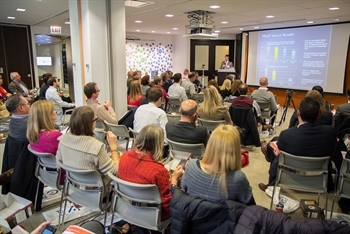
Metropolitan Planning Council
Traffic congestion costs the Chicago region $7.3 billion annually.
 By Tim Grzesiakowski and MPC Research Assistants Kevin Hawryluk and Jeffrey Nolish
By Tim Grzesiakowski and MPC Research Assistants Kevin Hawryluk and Jeffrey Nolish - December 13, 2013
“You can buy people out of their car. We’ve proven it,” stated Thomas Cerny, vice president and director of Transportation Demand Management (TDM) Services, URS Corporation, at Metropolitan Planning Council’s (MPC) Friday, Dec. 6 event and report release, Making the Case for Commute Options. The two-year Commute Options pilot, which worked with 16 regional employers and experimented with methods for coaxing employees out of their cars and into more sustainable commuting patterns, is now ready to expand into a permanent regional strategy.
At the event, David Kleinwachter, an engineer at Christopher Burke Engineering and Kate Gantzer-Hayes, trade marketing supervisor for Goose Island Beer Co., discussed their employers’ experiences with the pilot. Cerny talked about TDM programs around the country, and what makes them successful. TDM strategies, which act like marketing campaigns for different transportation modes throughout a city, state or region, provide people with useful resources and help them make the switch from commuting alone in a car to carpooling, taking transit or even walking to work.
Traffic congestion costs the Chicago region $7.3 billion annually, and although nine out of the 10 largest metropolitan areas across the country have adopted comprehensive TDM programs to mitigate congestion and reduce the number of employees driving alone to work, Chicago has not. Hence Commute Options, through which MPC surveyed more than 6,200 employees. Surveys focused on providing employers the opportunity to explore employee’s typical daily commutes, alternative transportation barriers and preferred modes of transportation. MPC then suggested strategies and incentives to employers to reduce expenses for commuters, lower costs of doing business, and expand commute options. And for many employers, the pilot translated into measurable results.

Burke provided generous incentives to employees who bike to work, including a $0.75-per-mile travel reimbursement. They also slashed their fleet of company vehicles, instead reserving I-GO cars during the work week at the Rosemont Blue Line station. As a result, the drive-alone rate dropped nine percent while bicycling and ridesharing doubled. “We doubled the biking numbers, we doubled transit numbers, quadrupled walking numbers,” said Kleinwacher, describing his companies’ pilot experience.
Goose Island Beer Company re-promoted pre-tax benefits, improved facilities for bicyclists, formalized their telework program, and drastically increased awareness of their sustainability programs, resulting in 50 percent employee participation in one or more of such programs. “If someone tries a different commute option they might realize it’s not that difficult, it’s not that inconvenient, hey, I like this better,” noted Gantzer-Hayes.
These incentives and results corroborate what Cerny had to say about TDM strategies nationally. Drawing from his experience, Cerny provided four key takeaways from lessons learned:
- TDM programs should focus on outreach activities and rely less on flashy ad campaigns.
- Employer incentives can work, based on successful programs in other US cities.
- TDM programs should not be membership-based but open to all who want to use them.
- Don’t reinvent the wheel; sometimes the simpler approach is the best approach.
These points underscore the need for employer involvement and establish that effective TDM programs do more than raise billboards—they reduce barriers to mode shift by connecting people with the resources they need.
MPC’s roundtable clarified why the Chicago region needs TDM and what it should look like. If there’s one positive in being the last major metropolitan area to develop a program, it’s that we know what works and what doesn’t. Stakeholders should support TDM. Consider the alternative: $7.3 billion is a pricey toll to pay.